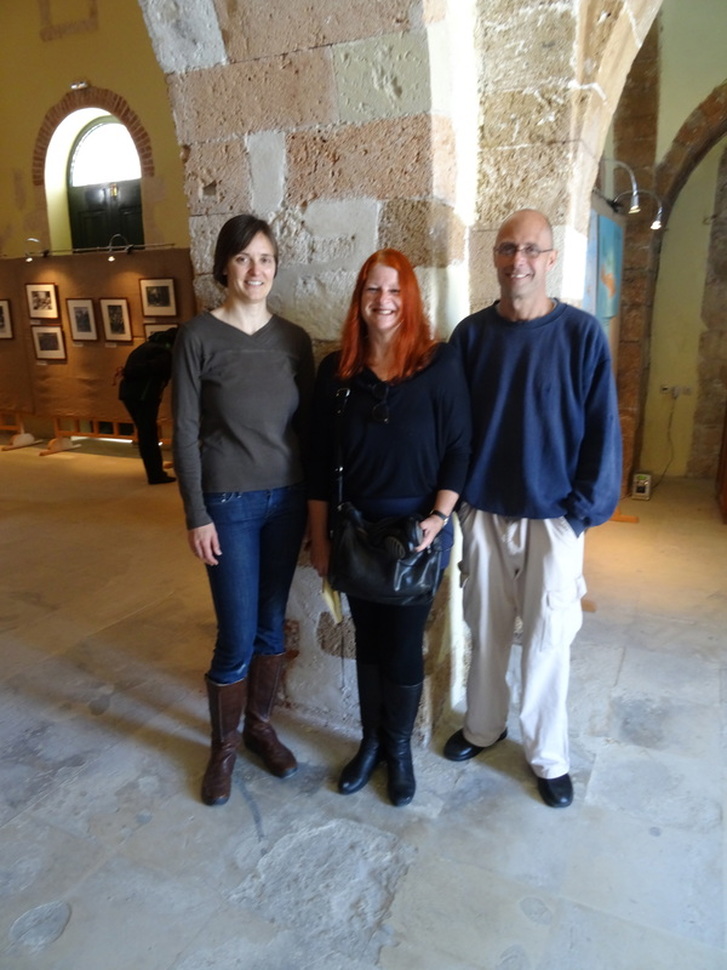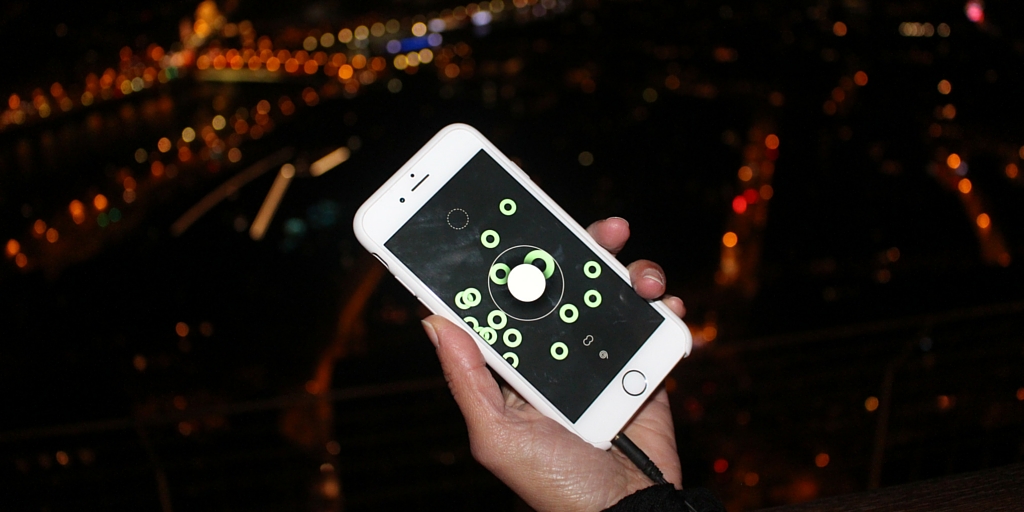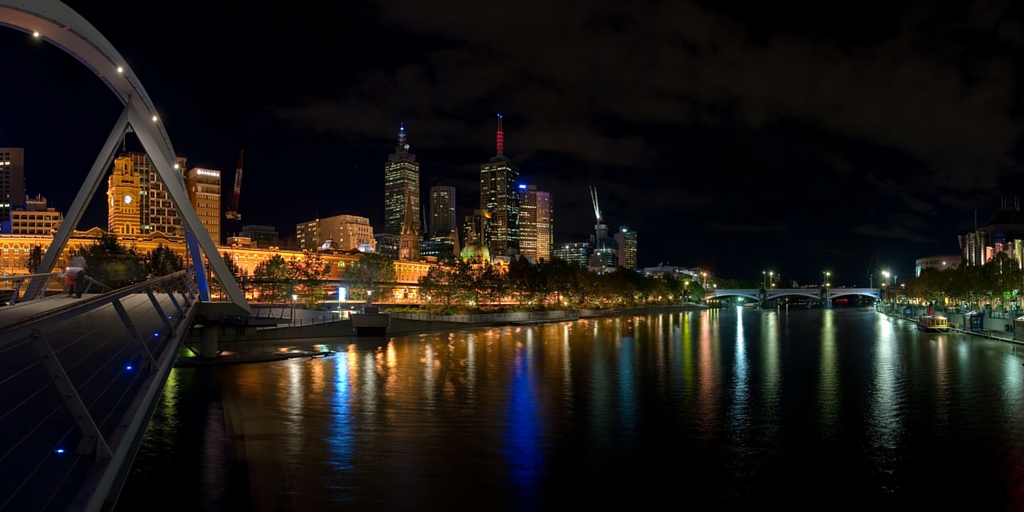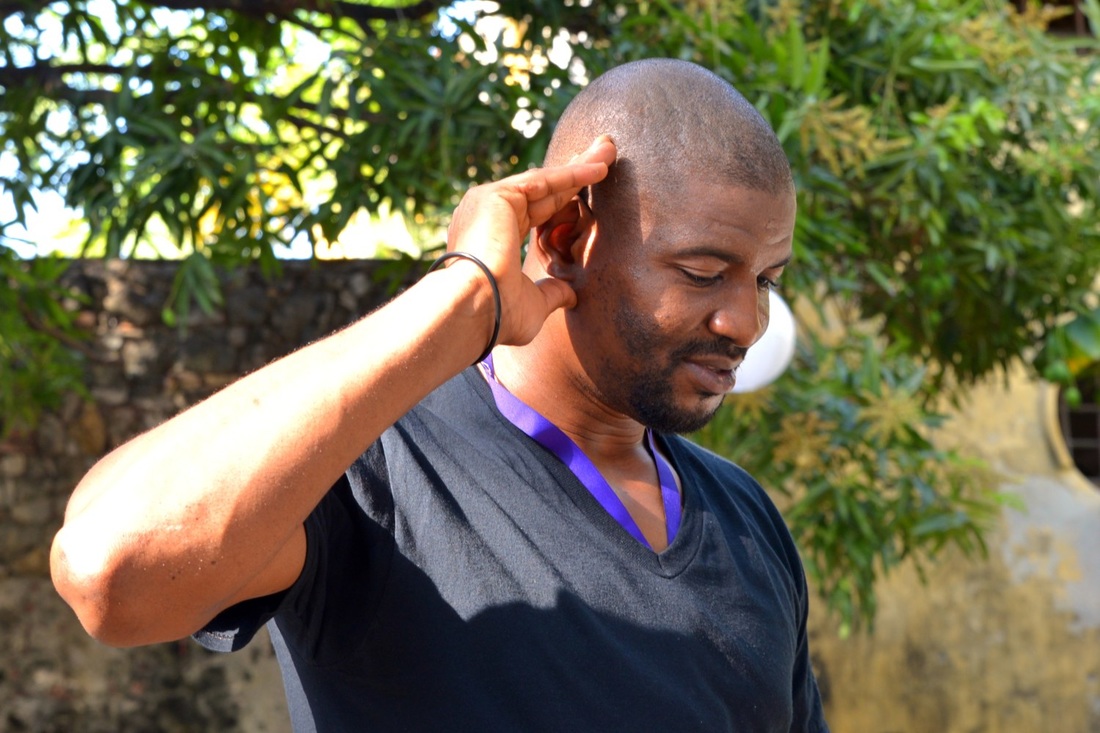|
Sound installation, photographic palimpsest, artists' talks, sound walks Dr Ros Bandt, Melbourne, Australia – Konstantin Fischer, Hania, Greece – Anja Zuckmantel, Hania, Greece Sabbionara Gate | Minoos str. / Epimenidou str. - akti Miaouli Hania, Crete, Greece May 19th - 29th 2016 ΑΚΟΥΣΤΙΚΟ ΠΑΛΙΜΨΗΣΤΟ
τα τείχη, τα ντουβάρια και τα Χανιά Ros Bandt, Αυστραλία μουσικός / καλλιτέχνις ήχου Konstantin Fischer, Χανιά εικαστικός Anja Zuckmantel, Χανιά ιστορικός Internationally renowned Australian sound artist Ros Bandt collaborates with local artist and photographer, Konstantin Fischer, and historian Anja Zuckmantel: they invite the people of Hania to listen to their town with fresh ears. The installation “Listening through the Walls” in the Sabbionara Gate, combines sound recordings, sonic notations, photographs and historical information, all regarding the walls of the old city – the walls themselves and the spaces inbetween. Hania is a unique acoustic, social and architectural habitat built over thousands of years. The people of Hania will be able to sign up for acoustic walks and to contribute feedback of their favourite listening spots as part of the exhibition. There will be artists' talks held at the venue, and four groups of pupils and students from Hania will participate in workshops, the outcome of which will be made visible to the public as part of the developing sound installation. The double CD Tarhu Connections, featuring the soundtrack from the exhibition will be launched with a live performance at the opening.
1 Comment
Yarra River Terrace & Federation Square, Melbourne
Monday 8th – Sunday 14th Feburary // 9:00am – 11:00pm River Listening is launching in Melbourne, Australia during Pause Fest 2016, a catalyst for innovation, a uniter of industries and a platform for the future. Six years ago, Pause’s founder George Hedon saw an opportunity to start bringing together a new breed of thinkers and Pause Fest is now established as a major international event for those working at the intersection of creativity, technology and innovation. Melbourne’s first River Listening installation explores the Yarra River. The installation can be experienced by walking along the Yarra River with a mobile device and listening to content that is geotagged along the river bank. As you walk along the path, the sounds of river system are layered with sonic art and river stories for Pause delegates to discover between sessions. In addition to the Yarra soundscapes, this experience will stretch through Federation Square with a sound map connecting to other river systems across the world. Listeners will hear Amazon river dolphins as they walk down the steps and pilgrims chanting on the banks of India’s Narmada River as they look towards the sky. These sonic discoveries will explore the value of sound and technology in contributing towards environmental awareness and engagement. As the recent documentary Racing Extinction highlights: if we can bring the sights and sounds of the natural world to humans who would otherwise never think about them, they might be motivated and inspired to alter their habits enough to take action and respond to the ramifications of climate change. To experience YARRA – RIVER LISTENING, Pause Fest delegates will download the free app Recho for this exclusive Pause Fest experience. The soundscapes will evolve with new sounds added everyday during Pause Fest. Follow @LeahBarclay on twitter for live updates onsite and join our daily demo sessions and sound walks by using the #RiverListening hashtag on twitter. You are invited to participate in World Listening Day 2016, an annual global event held on July 18.
The purposes of World Listening Day are to:
World Listening Day 2016’s theme, “Sounds Lost and Found,” calls on reminiscing, listening and observing what changes in our soundscapes have occurred in recent decades—be it language, nature, technology, music or even silence itself. For “Sounds Lost and Found,” we invite you to dig into crates of vinyl and cassettes, dive into digital archives, and engage deeply with memories and unheard languages to rediscover or identify these “lost sounds.” In doing so, “Sounds Lost and Found” hopes to spotlight the need for effective and accessible conservatory efforts to be implemented to preserve some of these sounds—whether those efforts include archival projects, changing our daily practices or supporting the preservation of indigenous languages and engaging with the keepers of and archiving fading oral traditions where that seems impossible. We can protect and celebrate sounds whose vitality can be vulnerable and fragile. World Listening Project, Midwest Society for Acoustic Ecology and Biosphere Soundscapes invite you to participate in World Listening Day 2016 on Monday, July 18, and through the week of July 16th-22nd. Some suggestions on how you can participate and organize include:
Our planet continues to change due to human involvement and interventions. People evolve. Cities morph. Technologies advance. We can hear the planet changing. Our soundscapes reflect evolution; whether created by humans, machines or nature the shifting presence and absence of sounds is affected by human activity in natural and industrial worlds. Cities’ sonic identities are continually fluctuating as residential and commercial infrastructures develop. The resultant social dynamics of industrialization and gentrification sponsor variegated relationships between people and the public and private places they occupy. Humans’ complex interactions with nature have encroached upon Earth’s autonomy and her anonymity. Phenomena such as pollution, deforestation and global warming are manifestations of natural processes; they are the aftershocks of industrial pursuits. Swaths of land have been decimated, dismantling animal ecosystems for human consumption and destruction. This reckless, shortsighted mode of interacting with non-human life has forced the retreat and extinction of many species, eliminating their sounds until there is silence. Technological advances over the past several centuries, particularly in recent decades, have been astronomical. Of late, machines and media become obsolete before we have even become proficient in using them. These advances have impacted the acoustics of commercial and residential spaces with newer versions of devices designed with quietness in mind Sounds produced by older models are noticeably more obtrusive. Most of these advancements can be seen as positive, though some sounds we were accustomed to or fond of have become less prevalent or been silenced in our relentless push toward progress ad infinitum. Some Questions of Inquiry
The theme for World Listening Day 2016 was developed by Nigerian sound artist Emeka Ogboh (@goslowlagos). Emeka is co-founder of the Video Art Network Lagos and works primarily with sound and video to explore ways of understanding cities as cosmopolitan spaces with their unique characters. |
Archives
November 2017
Categories
All
|




 RSS Feed
RSS Feed
